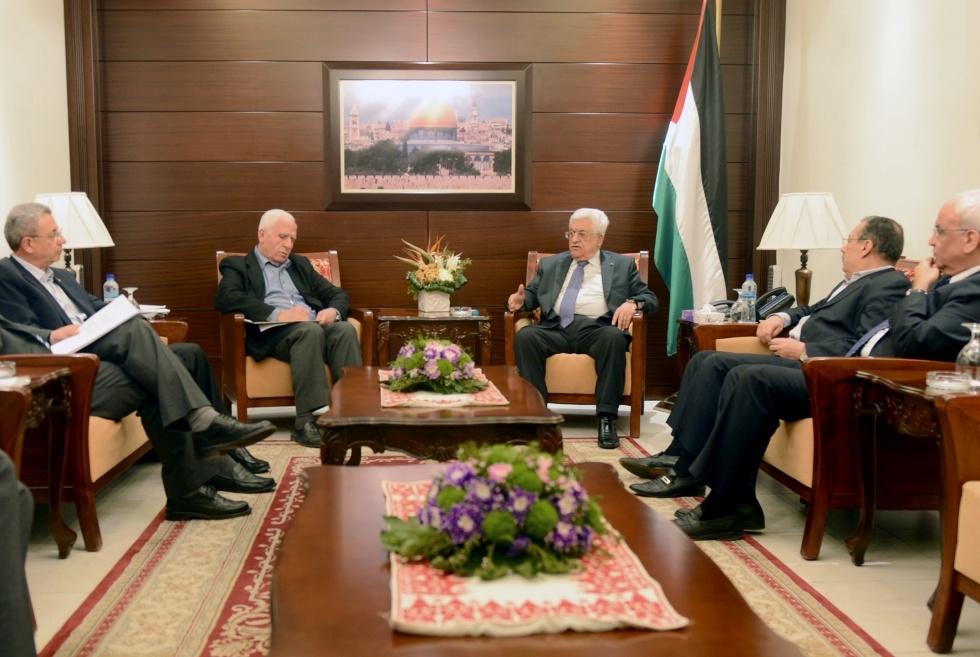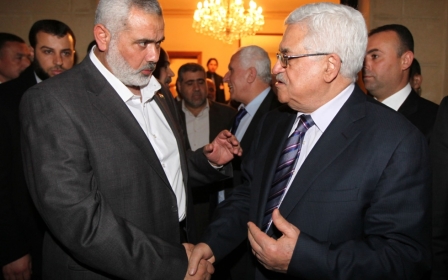Palestinians renew unity bid as Israel talks stall

The Palestinians have relaunched efforts to reconcile their rival leaderships in the West Bank and Gaza Strip as US-brokered peace talks with Israel teeter on the edge of collapse.
A week before a nine-month target originally set for an Israeli-Palestinian deal, a Palestine Liberation Organisation (PLO) delegation was expected in Gaza City on Tuesday to try to revive long-stagnant unity efforts.
The delegation had reported that they were facing difficulties on Monday reaching Gaza due to Israel's insistence that the group obtain permission to enter via the Israeli controlled Erez border crossing.
But they arrived late Tuesday and were greeted by Hamas prime minister Ismail Haniya and the movement's deputy leader Mussa Abu Marzuq, who arrived from Cairo on Monday.
The team is being led by Azzam al-Ahmad, a senior figure in the mainstream Fatah party of president Mahmoud Abbas, the head of the Western-backed Palestinian Authority (PA).
Independent MP Mustafa Barghouti and figures from two leftist parties, the Palestinian People's Party and the Palestinian Arab Front, are also in the delegation.
At the same time, the Palestinians refloated and then played down a threat to dismantle the PA, which is Israel's negotiating partner, if the Palestinian-Israeli peace talks remain deadlocked.
"No Palestinian is speaking of an initiative to dismantle the Palestinian Authority," chief negotiator Saeb Erakat said on Tuesday.
"But Israel's actions have annulled all the legal, political, security, economic and operational aspects of the prerogatives of the Palestinian Authority."
The PA was set up under the 1993 Oslo accords and has won widespread international recognition but is fully dependent on foreign aid for its administration of autonomous areas of the West Bank.
Palestinian negotiators have warned they may hand responsibility for governing the occupied territories back to Israel, a senior Palestinian official said on Sunday.
He said the Palestinians had told US peace envoy Martin Indyk that unless Israel releases Palestinian prisoners as agreed and freezes settlement building, they could dismantle the Authority.
US State Department spokeswoman Jennifer Psaki criticised the threat as "extreme" and warned that any such move would affect American aid to the Palestinians.
On the Israeli side, Prime Minister Benjamin Netanyahu accused the PA of endangering the peace process.
"The Palestinian Authority, which yesterday was talking about its dismantlement, is today talking about unity with Hamas," which fiercely opposes any peace talks with Israel, Netanyahu said.
"They need to decide... Do they want to dismantle themselves or to unite with Hamas? When they want peace (with Israel), they should let us know."
Consensus government, elections
Fatah, the PLO's main component, and Hamas signed a reconciliation accord in Cairo in 2011 aimed at ending the political divide between Gaza and the PA-ruled West Bank.
But deadlines have come and gone without any progress in implementing provisions of the accord.
According to Barghouti, the two sides will discuss "forming a national consensus government and holding elections," among other issues.
Haniya on Tuesday called for cementing Palestinian reconciliation "in order to form one government, one political system and one national programme".
Ahmad added: "I am happy that the time has come to end divisions."
Hamas is totally opposed to the Palestinian negotiations with Israel.
The two sides met Tuesday in Jerusalem with US peace envoy Martin Indyk in a fresh bid to salvage the negotiations. No statement was issued after the meeting.
As the meeting got underway, Abbas told Israeli journalists he was willing to see extend the negotiations beyond April 29 if Israel frees a batch of prisoners previously earmarked for release, freezes settlement building and agrees to discuss the borders of a future Palestinian state.
Israel and the PA have taken a string of hostile steps since the Jewish state refused last month to release the fourth and last group of Palestinian prisoners in line with an earlier agreement.
A senior Israeli government official rejected Abbas's terms.
"He who makes such conditions does not want peace," the official told AFP on condition of anonymity.
Middle East Eye propose une couverture et une analyse indépendantes et incomparables du Moyen-Orient, de l’Afrique du Nord et d’autres régions du monde. Pour en savoir plus sur la reprise de ce contenu et les frais qui s’appliquent, veuillez remplir ce formulaire [en anglais]. Pour en savoir plus sur MEE, cliquez ici [en anglais].



